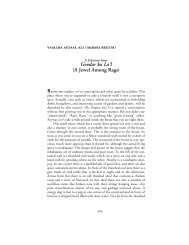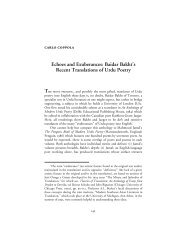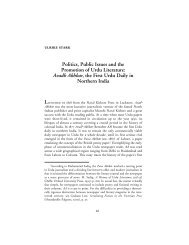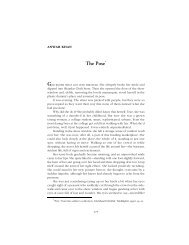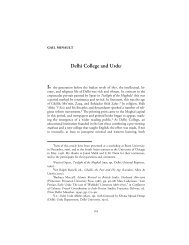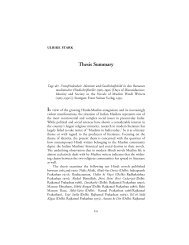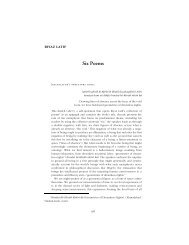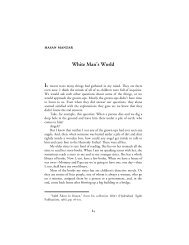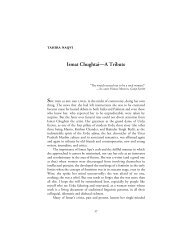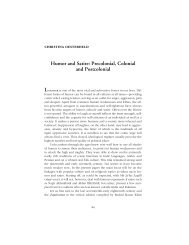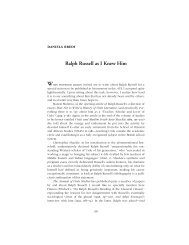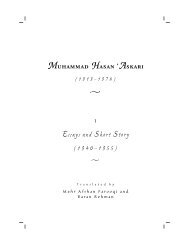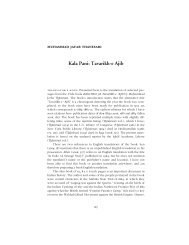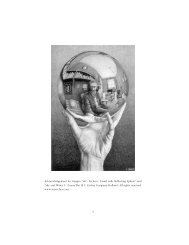Form or Mere Illusion?* - the Annual of Urdu Studies
Form or Mere Illusion?* - the Annual of Urdu Studies
Form or Mere Illusion?* - the Annual of Urdu Studies
- No tags were found...
Create successful ePaper yourself
Turn your PDF publications into a flip-book with our unique Google optimized e-Paper software.
Muhammad Hasan Askari • 9been able to see how truth and goodness could remain pure and unc<strong>or</strong>ruptedin a greed-ridden society. Whenever <strong>the</strong>y declare <strong>the</strong> unity <strong>of</strong> truthand beauty, what <strong>the</strong>y strive f<strong>or</strong> is to somehow escape responsibility f<strong>or</strong>thinking about <strong>or</strong> setting up standards f<strong>or</strong> truth and goodness. In spite <strong>of</strong>this vociferous declaration, <strong>the</strong>ir eff<strong>or</strong>t has been concentrated mainly onturning art into an aes<strong>the</strong>tically satisfying collection <strong>of</strong> f<strong>or</strong>mal relationshipsin which ethical <strong>or</strong> unaes<strong>the</strong>tic elements carry no significance. Ino<strong>the</strong>r w<strong>or</strong>ds, conferring an objective status on art that cannot be subjectedto <strong>the</strong> tribunal <strong>of</strong> ethical standards, exactly like a tree <strong>or</strong> a stone that cannotbe considered good <strong>or</strong> bad from a m<strong>or</strong>al point <strong>of</strong> view. All one can dois accept <strong>the</strong>ir existence.After all, psychologically and biologically a definitive and total objectivityis not accessible in art. Not, at least, until a chemical change occursin man <strong>or</strong> a w<strong>or</strong>k <strong>of</strong> art is b<strong>or</strong>n from his stomach like a baby. Anyway,alongside <strong>the</strong> individualism and subjectivity <strong>of</strong> <strong>the</strong> new artist, one alsonotices a tendency to make a w<strong>or</strong>k <strong>of</strong> art as much as possible an objectiveelement based on aes<strong>the</strong>tic and technical considerations and increasinglyfree <strong>of</strong> ethical standards. Stéphane Mallarmé (1842–1898) presents <strong>the</strong> concept<strong>of</strong> ìpure poetry.î Paul Verlaine (1844–1896) proposes that poetic linesshould be music, first and f<strong>or</strong>emost and maximally, anything else is ìjustliterature.î ìImpressionismî makes its appearance in painting; it does notlook at life as a whole and is satisfied with merely a fleeting impression,which makes technique paramount. In <strong>the</strong> novel, Gustave Flaubert (1821–1880) clam<strong>or</strong>s f<strong>or</strong> <strong>the</strong> independence <strong>of</strong> art and its superi<strong>or</strong>ity, and verynearly turns it into a religion requiring monkish sacrifices and exercises.Subject is irrelevant to him, expression is everything. And <strong>the</strong>re are <strong>the</strong>Naturalists. Although not exactly lovers <strong>of</strong> art, <strong>the</strong>y do study man with <strong>the</strong>impersonal objectivity <strong>of</strong> a scientist dissecting an animal. Naturally what ascientist attempts to discover does not come within <strong>the</strong> purview <strong>of</strong> ethicalstandards. So, in foisting <strong>the</strong> objectivity <strong>of</strong> science on art, <strong>the</strong> Naturalists,too, in fact, attempt, even if unconsciously, to distance <strong>the</strong>mselves fromethical issues and judgments.In sh<strong>or</strong>t, <strong>the</strong> end result <strong>of</strong> all <strong>the</strong> <strong>the</strong><strong>or</strong>izing and conceptualization <strong>of</strong>this period was that artists, exhausted from <strong>the</strong> ethical struggle and despairing<strong>of</strong> success, wanted to somehow disengage <strong>the</strong> concept <strong>of</strong> beautyfrom those <strong>of</strong> truth and goodness. They could not see any way f<strong>or</strong> honestartistic creation except through such disengagement. Since truth andgoodness are such imp<strong>or</strong>tant concepts that <strong>the</strong>y could not be set aside,<strong>the</strong>y talked <strong>the</strong>mselves into believing that beauty inherently included <strong>the</strong>o<strong>the</strong>r two.It is likely that assigning beauty an independent and supreme status



